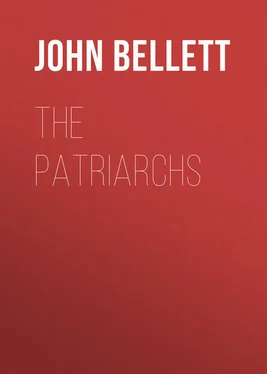John Bellett - The Patriarchs
Здесь есть возможность читать онлайн «John Bellett - The Patriarchs» — ознакомительный отрывок электронной книги совершенно бесплатно, а после прочтения отрывка купить полную версию. В некоторых случаях можно слушать аудио, скачать через торрент в формате fb2 и присутствует краткое содержание. Жанр: foreign_antique, foreign_prose, Биографии и Мемуары, на английском языке. Описание произведения, (предисловие) а так же отзывы посетителей доступны на портале библиотеки ЛибКат.
- Название:The Patriarchs
- Автор:
- Жанр:
- Год:неизвестен
- ISBN:нет данных
- Рейтинг книги:4 / 5. Голосов: 1
-
Избранное:Добавить в избранное
- Отзывы:
-
Ваша оценка:
- 80
- 1
- 2
- 3
- 4
- 5
The Patriarchs: краткое содержание, описание и аннотация
Предлагаем к чтению аннотацию, описание, краткое содержание или предисловие (зависит от того, что написал сам автор книги «The Patriarchs»). Если вы не нашли необходимую информацию о книге — напишите в комментариях, мы постараемся отыскать её.
The Patriarchs — читать онлайн ознакомительный отрывок
Ниже представлен текст книги, разбитый по страницам. Система сохранения места последней прочитанной страницы, позволяет с удобством читать онлайн бесплатно книгу «The Patriarchs», без необходимости каждый раз заново искать на чём Вы остановились. Поставьте закладку, и сможете в любой момент перейти на страницу, на которой закончили чтение.
Интервал:
Закладка:
The Patriarchs Being Meditations upon Enoch, Noah, Abraham, Isaac, Jacob, Joseph, Job; The Canticles, Heaven and Earth
ENOCH
It is not so much of Enoch himself that I now purpose, in the Lord's grace, I would hope, to write a little, but rather of the times and the saints before the flood. Whether it be of them or of him, the materials, as we know, are very scanty; but in the way and wisdom of the Spirit of God, they are full of meaning and of value.
A peculiar attraction has been commonly felt in the Book of Genesis.
The simplicity of the narratives has to account for much of this, I doubt not. Human life is in its infancy and artlessness. The scenes are domestic, and the habits and manners such as family duties and affections were forming. This is a great source of enjoyment to the mind from this book. Such springs of pleasure are at times tasted in spite of ourselves. We are spoiled very much by the customs of the world, and we suppose that we like them. But still we find ourselves naturally at ease in such scenery as that which this lovely book presents to us. The wife of one wealthy lord, who numbered his servants by hundreds, and his flocks by thousands, would knead the cake for the traveller; and the daughter of another, without practising the language of apology, would be seen by strangers watering the family herds.
Yet with all this there was the truest courtesy. The honour due to all men was as well understood as the love of kindred. It was not barbaric life, though simple and inartificial. It was not rude simplicity; but that which came from an influence that could mould and adorn life. And that influence was the knowledge of God. The times of this book were, as we know they were, unindebted to the advance of civility, or the regulations of cultivated life; but still the state of things was not barbarous, just because there was the knowledge of God. The hand of God was felt, while as yet the conceits of polished life had not time or liberty either to garnish or soil the scene.
It is this which fashions the manners of these early times. Peculiar they are, deeply commending themselves to a right mind; but enough, perhaps, to provoke the smile of many who belong to times like ours. For strange nowadays would be the confidential friendship of a master and his servant. And yet such was between Abraham and Eliezer, though all the while the duties and rights of the relationship were religiously observed. And how unwarrantable would it now be judged, that the intended husband of one of the daughters, or the son-in-law himself, as in the case of Laban and Jacob, should tend the family flocks in the heat of day and frost of night, getting his wages! And yet in all this there is no moral offence whatever; nothing but what may charm the nicest sensibilities of our nature.
But that which ought to lend this book its principal power to engage us is this: the Lord Himself is seen in it in ways and characters suited to this simple and primitive style. The action of the book being very much domestic, plain and unadorned, His way is according. Whether He communicates His mind, or manifests His presence, it is after this same pattern. He does not employ prophets, but personally makes His pleasure known. It may be in a dream, or with a voice, as well as by personal manifestation; but still it is Himself . And even if angels are employed, they are rather His companions than His messengers .
In the cool of the day, or the afternoon, He walked in the garden. In the field He pleaded with Cain, personally pleaded with him, adding the weight and authority of His own presence to a moment of awful and solemn interest. He came down at the cry of Babel, and the cry of the sin of Sodom, just that He might see, as we would do, whether things were really as bad as they were said to be. In forms of intimacy He again and again appeared to Abraham, Isaac, and Jacob; inviting confidence, expressing displeasure, or conveying His purpose, in ways of full personal familiarity. And though, in the progress of the book, this style may grow a little slack, still it is maintained in measure to the end, even where we might have least expected it. For to kings, not of the stock of Abraham, the Lord God appeared in dreams by night, and, without amazement, warned them of their duty, or told them of their danger.
The ministry of prophets, as I observed, is not employed. That would have been too distant, too reserved, to suit the general style. Nor is the divine pleasure communicated through the Holy Ghost, or by inspiration. That is not the way either-not the usual way. But it is, as we have seen, the personal interference of the Lord Himself, coming in a vision, or by a dream or a word; or in the still nearer way of taking the forms and attributes of manhood; and that, too, not in mystic dress, as afterwards to such as Isaiah, Daniel, or John; but as one who was meeting man in his place and circumstances. As a traveller, needing hospitality, He eats of a calf and a cake at the tent door with one; with another He contends and wrestles, as a man with his fellow, having a quarrel or matter of dispute with him.
See all this style of action in the case of Noah. How interestedly does the Lord God enter into the whole state of things in that day! Just as we all feel, His eye affects His heart. And then, just as we all do, He takes counsel with Himself. He saw the wickedness of man that it was great; it grieved Him to the heart; and then He said, "I will destroy man whom I have created from the face of the earth." And after all this, just as we ourselves would do, having taken His counsel, He communicates it to a friend, passing it to the ear, and the heart, and the sympathies of another.
It was thus that the Lord dealt with Noah. He dealt with him as a man with his friend, as well as like God with an elect sinner. And we ourselves practise these ways. We love these confidences of friendship. We love a second self. "The end of all flesh is come before Me," says the Lord to Noah, telling him what had been passing in His own bosom. And afterwards, in the day of the waters, in the same way of gracious friendship, when the ark was about to float upon the scene of the judgment, "the Lord shut him in." With His own hand He did it.
Here was intimacy. Here was living, palpable nearness of the Lord God to His creature. And this is in character with His general actings and communications in this book. The glory was not as yet taking its place in a dispensation, shrouded in a cloudy chariot, or seated between cherubim. In all that there was majesty and conscious greatness, and the distance of holiness, as suited an ordered economy. But in the times of Genesis this was not so. Things were informal, and the action was desultory; and the Lord was in person, as the occasion demanded, according to this.
In this manner do we find the action of this beautiful book. The elect of God are thus, and thus is the living God Himself. It is as divine as anything else in the Word. And the soul so receives it. And good reason have we for blessing the Lord, because He has introduced our hearts to such a book as this. For we are not always ready for the higher things. We cannot at all times reach them, or obey a summons to ascend the heavenly places. But the Spirit of God is tender of our weakness, and has provided for it. The Scriptures, if I may take leave to speak in a figure, have change of air and change of scene for our souls.
It is relish and appetite we have to covet, beloved-a holy delight in the things of God, whether they be the things of the "children" or of the "fathers;" the pure milk or the strong meat. Little ones in His school are still living ones. That is the blessed thing. He who liveth in the mere power of intellect, or in the schools of men, is dead while he liveth.
Читать дальшеИнтервал:
Закладка:
Похожие книги на «The Patriarchs»
Представляем Вашему вниманию похожие книги на «The Patriarchs» списком для выбора. Мы отобрали схожую по названию и смыслу литературу в надежде предоставить читателям больше вариантов отыскать новые, интересные, ещё непрочитанные произведения.
Обсуждение, отзывы о книге «The Patriarchs» и просто собственные мнения читателей. Оставьте ваши комментарии, напишите, что Вы думаете о произведении, его смысле или главных героях. Укажите что конкретно понравилось, а что нет, и почему Вы так считаете.












